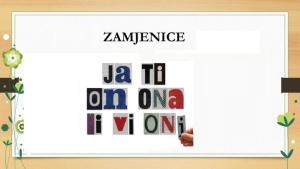Just as nouns and adjectives change in different cases, so do personal pronouns. In Montenegrin they have a short and a long form. The long form is used:
*for emphasis
* after a preposition
*in the initial position in a sentence.
The short form is far more prevelient in everyday speech.
Personal pronouns in nominative case
Ja (I) Mi (we)
Ti (you) Vi (you)
On (he) oni (they)
Ona (she) one (they)
Ono (it) ona (they)
Personal pronouns in accusative case
Mene (me) Nas
Tebe (te) Vas
Njega (ga) Njih (ih)
Nju (ju, je) Njih (ih)
Njega (ga) Njih (ih)
Short form: Vidim ga. (I see him)
Long form: Njega vidim. (I see him – as opposed to someone else)
Long form: To je dobro za njega. That is good for him. (after preposition)
Personal pronouns in genitive case
Most forms fir the personal pronouns in the genitive are identical to the accusative:
Mene (me) Nas
Tebe (te) Vas
Njega (ga) Njih (ih)
Nju ( je) Njih (ih)
Njega (ga) Njih (ih)
Dative/Locative case
The personal pronouns can only have the long form in the locative because this case always uses a preposition. The general rule is: in any case only a long-form pronouns can follow a preposition.
Meni (mi) Nama (nam)
Tebi (ti) Vama (vam)
Njemu (mu) Njima (im)
Njoj ( joj) Njima (im)
Njemu (mu) Njima (im)
Instrumental case
Mnom Nama
Tobom Vama
Njim Njima
Njom Njima
Njim Njima
Translate the following sentences:
- The book is for you. ___________________________________________________________
- I see them. ___________________________________________________________
- She knows him. ___________________________________________________________
- We visit her often. ___________________________________________________________
- My friends are thinking about me. ________________________________________________
- Is there anything for us? _______________________________________________________
- I have it. ____________________________________________________________________
Possesive pronouns
Possesive pronous behave like adjectives in terms of their form. They refer to the noun they modify and agree with it in gender and number.
Engl. masculine feminine neuter plural
My moj moja moje moj –i, -e, -a
Your tvoj tvoja tvoje tvoj-i, -e, -a
His, its njegov njegova njegovo njegov-i, -e, -a
Her njen njena njeno njen-i, -e, -a
Our naš naša naše naš-i,-e, -a
Your vaš vaša vaše vaš-i, -e, -a
Their njihov njihova njihovo njihov-i, -e, -a
Here is how possessive pronouns look in accusative. Remember, they behave exactly like any other adjective and have the same ending as adjectives in all cases.
My Our
m. anim. –og/eg mog -e moje
m. inan. Same as nom. Moj -e moje
neu. Same as nom moje -a moja
F. –u moju -e moje
In genitive possessive pronouns also have the same endings as adjectives.
m. –og mog -ih mojih
neu. –og mog -ih mojih
f. –e moje – ih mojih
Dative/Locative
m. –om/em mom -im mojim
neu. –om/em mom -im mojim
f. –oj mojoj – im mojim
Instrumental
m. –im mojim -im mojim
neu. –im mojim -im mojim
f. –om mojom – im mojim
Interrogative affirmative neutral negative
Ko (who) neko (somebody) iko (anybody) niko (nobody)
Šta (what) nešto (something) išta (anything) ništa (nothing)
Gdje (where) negdje (somewhere) igdje (anywere) nigdje (nowhere)
Kuda (where to) nekuda (somewhere) ikuda (anywhere) nikuda (nowhere)
Kada (when) nekada (once, at some time) ikada (ever) nikada (never)
Kako (how) nekako (somehow) ikako (in any way) nikako (in no way)
Kakav (what kind) nekakav (some kind) ikakav (any kind) nikakav (not any kind)
Čiji (whose) nečiji (somebody’s) ičiji (anybody’s) ničiji (nobody’s)
Examples:
Ko ovdje nešto zna? Who knows somethng here?
Da li ovdje iko išta zna? Does anybody here know anything?
Ovdje niko nikada ništa ne zna. Here nobody ever knows anything.
Da li je ovo ičiji sto? Is this anybody’s table?
Da li je ovo nečiji sto? Is this somebody’s table?
Ne, ovo nije ničiji sto No, this is nobody’s table.
Translate the following:
- Does anyone have a pencil?
- I never see you.
- Can you find any kind of car?
- This is nobody’s house.
- I am not going to the movies with anyone.
- I am not thinking about anything.
- Nobody sees him.
- Do you ever travel to Montenegro in summer?
- She never travels anywhere.
- They are not talking about anybody.

